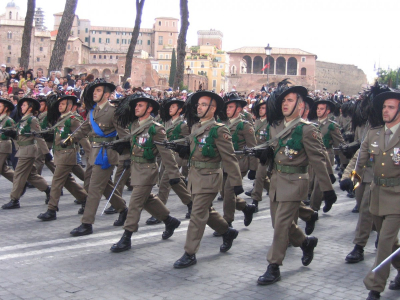The Capture of Rome (Italian: Presa di Roma) on 20 September 1870 was the final event of the unification of Italy (Risorgimento), marking both the final defeat of the Papal States under Pope Pius IX and the unification of the Italian Peninsula (except San Marino) under the Kingdom of Italy.
The capture of Rome by the Italian Army brought an end to the Papal States, which had existed since 756, and the temporal power of the Holy See, and led to the establishment of Rome as the capital of unified Italy. It is today widely commemorated throughout Italy, with the Via XX Settembre street name in a considerable number of localities.
The Bersaglieri, singular Bersagliere, (Italian pronunciation: [bersaʎˈʎɛːri]), "sharpshooter") are a speciality of the Italian Army's infantry corps. They were originally created by General Alessandro La Marmora on 18 June 1836 to serve in the Royal Sardinian Army, which later became the Royal Italian Army. They can be recognized by their distinctive wide-brimmed hats decorated with black capercaillie feathers, which is worn with the dress uniform. The feathers are also applied to their combat helmets.

1870Sep, 20
Bersaglieri corps enter Rome through the Porta Pia and complete the unification of Italy, ending de facto the temporal power of popes.
Choose Another Date
Events on 1870
- 15Jan
Thomas Nast
A political cartoon for the first time symbolizes the Democratic Party with a donkey ("A Live Jackass Kicking a Dead Lion" by Thomas Nast for Harper's Weekly). - 30Mar
Reconstruction Era
Texas is readmitted to the Union following Reconstruction. - 12May
Royal Assent
The Manitoba Act is given the Royal Assent, paving the way for Manitoba to become a province of Canada on July 15. - 18Jul
Papal infallibility
The First Vatican Council decrees the dogma of papal infallibility. - 19Sep
Siege of Paris (1870-71)
Franco-Prussian War: The Siege of Paris begins, which will result on January 28, 1871 in the surrender of Paris and a decisive Prussian victory.

 English
English  español
español  français
français  português
português  русский
русский  العربية
العربية  简体中文
简体中文 